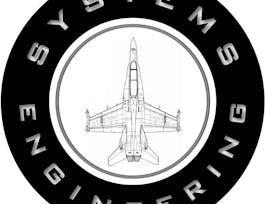In this course, you will learn what a systems engineer does. Following the conceptual foundations from The Need for Systems Engineering, you will perform requirements analysis and functional analysis on engineering programs. You will learn how to perform a trade study using a methodical, quantitative approach that is universal in application. This course also covers preparing design reviews, focusing on coordinating the inputs of multiple engineering disciplines into a cohesive description of the design approach.


Applying Systems Engineering to the Design Process
This course is part of Introduction to Systems Engineering Specialization
Taught in English

Instructor: William Van Atten
Included with 
Course
(11 reviews)
Recommended experience
What you'll learn
Describe the core roles and responsibilities of a systems engineer
Define a system including its specifications, requirements, and functions
Identify decision support approaches
Skills you'll gain
Details to know

Add to your LinkedIn profile
7 quizzes
Course
(11 reviews)
Recommended experience
See how employees at top companies are mastering in-demand skills

Build your subject-matter expertise
- Learn new concepts from industry experts
- Gain a foundational understanding of a subject or tool
- Develop job-relevant skills with hands-on projects
- Earn a shareable career certificate


Earn a career certificate
Add this credential to your LinkedIn profile, resume, or CV
Share it on social media and in your performance review

There are 5 modules in this course
We will begin the course by revisiting the topic of requirements. Now that we know what requirements are and how to write them, we will examine what requirements management is all about. On a long-duration development program, we also need a way to measure our progress from a technical standpoint toward requirement compliance. A great tool for this is to think of it in terms of Measures of Performance. At the tactical level on a design team, we will execute that by establishing a small number of Technical Performance Measures, or TPMs. These important performance attributes will keep the design team focused on the customer's most important requirements and they will help assess our progress toward meeting those objectives.
What's included
6 videos4 readings1 quiz1 peer review1 discussion prompt
In this module, will begin by describing the overall design process by tying in the concepts that we have learned to date into something that can be planned and tracked during execution. We will then learn about the "Big Three" design reviews, namely the System Requirements Review, or SRR; the Preliminary Design Review, or PDR; and the Critical Design Review, or CDR. In addition to the reviews, the Systems Engineering process also incorporates a series of audits to ensure that the documentation is all squared away. The most commonly used audits are the Functional and Physical Configuration Audits, the FCA and PCA.
What's included
4 videos3 readings2 quizzes
In this module, we will go over the topic of manufacturability. How do incorporate manufacturability considerations into the design process? It is considered so important that it has its own acronym, DFM, or Design for Manufacturability. We will also cover the process used for evaluating how ready a company is to scale up from low-volume development to high-volume production. In the second part of the module, we will learn about trade studies and how to conduct one.
What's included
5 videos3 readings2 quizzes
In this module, we are going to learn about what I call the "other engineering disciplines." I am going to group Software into this very loosely defined umbrella title with the hopes that I don't earn the ire of those who have chosen that as their profession. Rhis is more a sign of my own lack of close familiarity with the discipline. I have learned that managing development programs that include a significant software effort deserves special consideration when it comes to coordinating software development with hardware development and properly allocating time and resources to get both sides of the development effort completed. I will also cover what I call "the -illities" or the engineering disciplines like Reliability, Maintainability and others. I may even work in a few F/A-18 stories along the way!
What's included
2 videos3 readings1 quiz
In this final module, we will look at how our most precious asset, our people, are assigned to a particular design effort. What are some of the important considerations that go into those decisions. We will also look at some of my favorite leadership traits from my time in the Marine Corps and how those can be applied to working in the aerospace industry. Systems Engineering is by nature a leadership role, at least at certain times, so it is important to think about leadership well before the moment we find ourselves in the spotlight.
What's included
2 videos3 readings1 quiz
Instructor

Offered by
Recommended if you're interested in Leadership and Management

University of Colorado Boulder

University of Colorado Boulder

University of Colorado Boulder
Get a head start on your degree
This course is part of the following degree programs offered by University of Colorado Boulder. If you are admitted and enroll, your coursework can count toward your degree learning and your progress can transfer with you.
Why people choose Coursera for their career




New to Leadership and Management? Start here.

Open new doors with Coursera Plus
Unlimited access to 7,000+ world-class courses, hands-on projects, and job-ready certificate programs - all included in your subscription
Advance your career with an online degree
Earn a degree from world-class universities - 100% online
Join over 3,400 global companies that choose Coursera for Business
Upskill your employees to excel in the digital economy
Frequently asked questions
Access to lectures and assignments depends on your type of enrollment. If you take a course in audit mode, you will be able to see most course materials for free. To access graded assignments and to earn a Certificate, you will need to purchase the Certificate experience, during or after your audit. If you don't see the audit option:
The course may not offer an audit option. You can try a Free Trial instead, or apply for Financial Aid.
The course may offer 'Full Course, No Certificate' instead. This option lets you see all course materials, submit required assessments, and get a final grade. This also means that you will not be able to purchase a Certificate experience.
When you enroll in the course, you get access to all of the courses in the Specialization, and you earn a certificate when you complete the work. Your electronic Certificate will be added to your Accomplishments page - from there, you can print your Certificate or add it to your LinkedIn profile. If you only want to read and view the course content, you can audit the course for free.
If you subscribed, you get a 7-day free trial during which you can cancel at no penalty. After that, we don’t give refunds, but you can cancel your subscription at any time. See our full refund policy.


